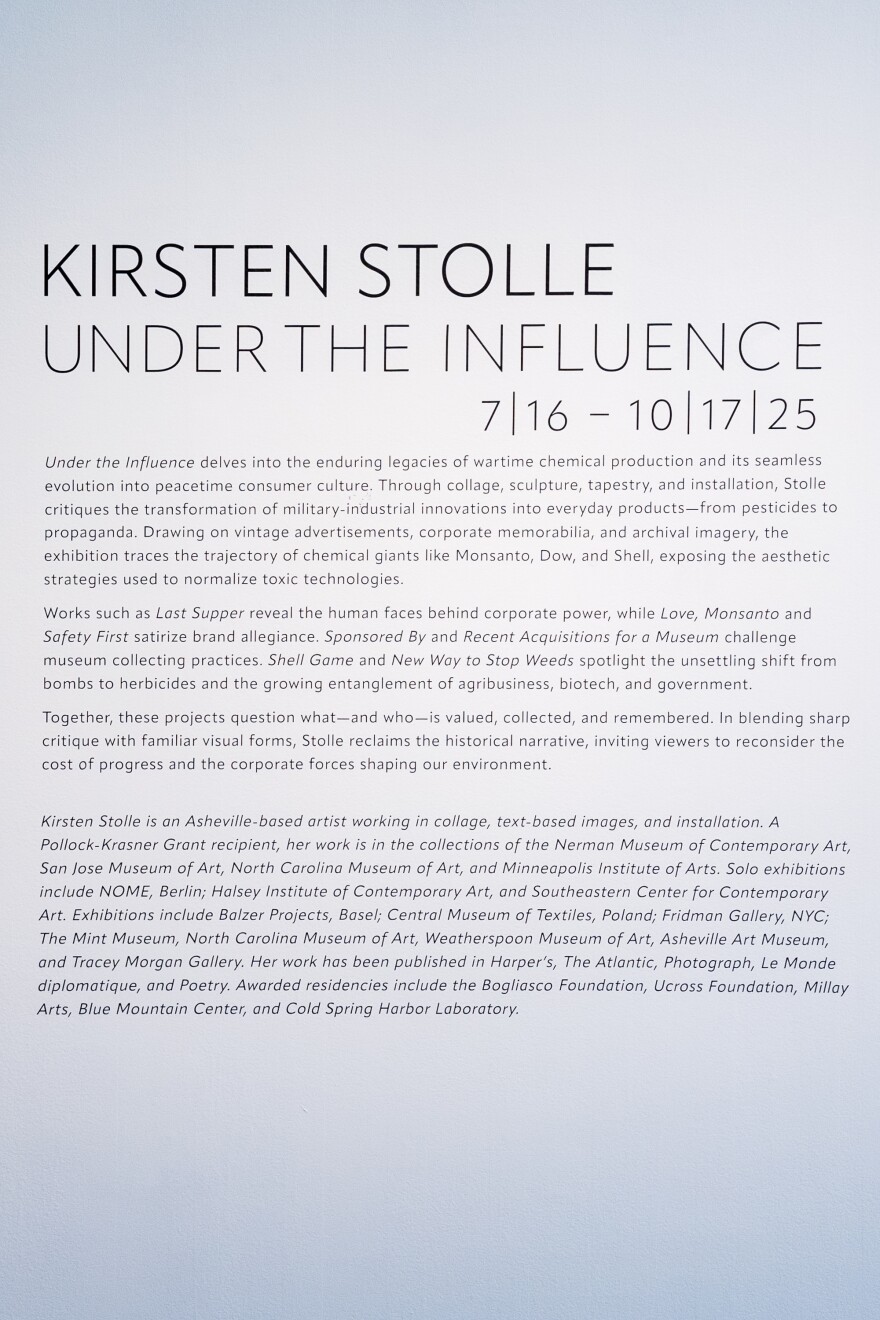Congress has cut federal funding for public media — an $800,000 loss for WFAE. We count on readers like you to protect our nonprofit newsroom. Become a monthly member and sustain local journalism.
A new art exhibit in uptown Charlotte explores how companies use rhetorical sleight of hand to escape public scrutiny.
Asheville-based artist Kirsten Stolle’s latest works explore the concept of greenwashing, which she described as “putting an environmental sheen on something that is either blatantly not environmental, or at best, minimally environmental.” Her installation, “Under the Influence,” looks at the history of agrochemical companies Monsanto and Bayer.
UNC Charlotte’s Dubois Center is hosting the installation. Digital prints, a woven tapestry and other mixed-media artworks adorn the walls of the center’s Projective Eye Gallery.
In “Last Supper,” she created a tapestry by repeating an image from a 1952 Monsanto retirement dinner. She said she applies a research-driven approach to her pieces:
“I went back to look at what the gladiolas, what color the gladiolas would have been in 1952 in St. Louis, which is where [Monsanto is] based,” Stolle said. She did the same for the men’s suits and ties. “I worked with a graphic designer to manipulate [the image] in Photoshop and create this tapestry.”

Part of her process involves recontextualizing propaganda to highlight the absurdity of corporate branding. In the center of the room, a display case mimics a museum exhibit, showcasing Monsanto-branded matches, watches and even a 1953 vinyl for the song “Monsanto March” by the Don Juan Quartet.
Much of her work links the history of pesticide litigation to the modern day. In a series called “New Ways to Stop Weeds,” green and orange neon lights frame collages of old pesticide advertisements. In one piece, the word “paraquat” repeats on a white background, intersecting with black-and-white images of a grape field to form a cross. The name “Syngenta” interrupts the pattern about two-thirds of the way down.
“The company Chevron was promoting this really deadly pesticide called paraquat in the grape fields,” Stolle said. “Syngenta recently bought it, and there have been lawsuits against paraquat for causing Parkinson's.”

Since 2017, Syngenta has been sued thousands of times for the alleged connection between paraquat exposure and Parkinson’s or kidney disease. A few people die from paraquat poisoning annually, according to the Cleveland Clinic. The chemical is toxic to the touch and through ingestion.
In another piece, Stolle blows up a page from a Bayer memo that discusses the acquisition of Monsanto, referencing the “increasing number of litigations” that the company inherited from purchasing the product Roundup. A 2024 financial report tallied approximately 181,000 claims against its Monsanto subsidiary.
“Instead of paying out or fighting the lawsuits, they are going state by state trying to get immunity,” said Brooks Rainey Pearson, a lobbyist for the Southern Environmental Law Center.
During the current legislative session, Bayer lobbyists visited Raleigh to petition state lawmakers. An early version of the 2025 farm bill would have made suing pesticide companies more difficult for consumers.
More recent revisions have omitted this language, and the bill has yet to pass. Stolle’s installation will be on display at the Dubois Center in uptown until Oct. 17.



